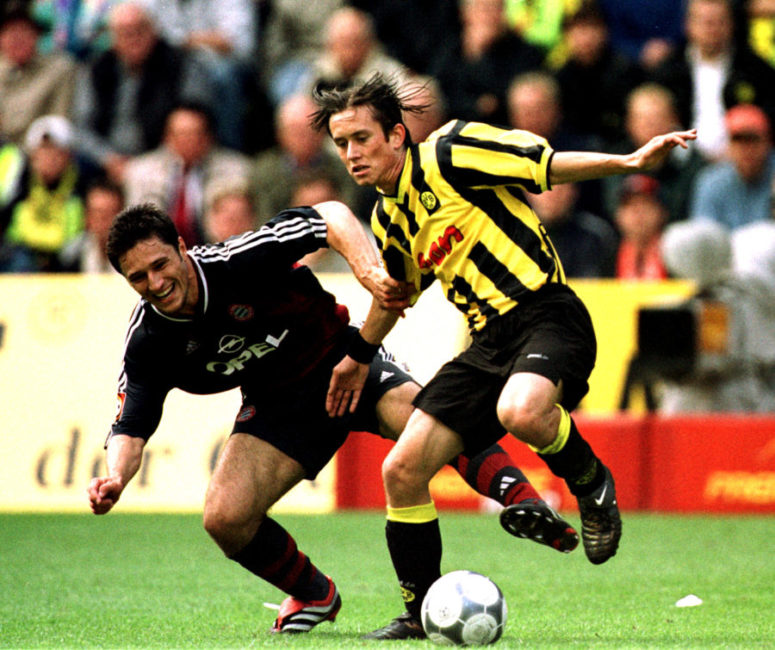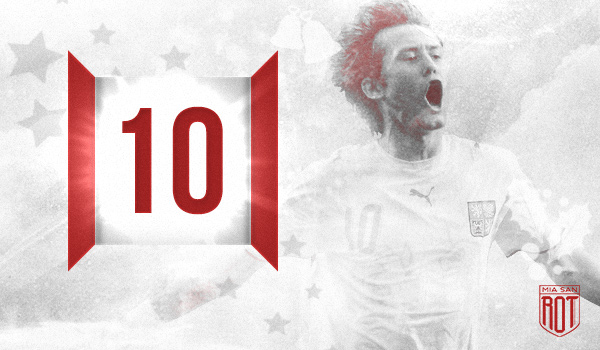The MSR advent calendar: Our favorite signings that never happened: Door 10 – Thomas Rosicky
The situation with the player
Rosicky made his debut at the age of 18 with his home club Sparta Prague and besides winning two championships in a row with his club, he also drew attention to himself in the Champions League. His two goals in the group phase against Shakthar and Arsenal FC in the 2000/2001 season put him on the radar of all European top clubs. Before that he had already competed with the Czech national team at the 2000 European Championships. Despite his young age, Rosicky had already found his place as a left offensive midfielder at that time.
When it became clear that Rosicky would leave Sparta in the winter break 2000/2001, he had a broad range of suitors to choose from.
The situation at the club
In the winter of 2000, FC Bayern was in the middle of the great run of the Kahn/Effenberg era, which was to end shortly afterwards with the Champions League title in 2001. During this phase, the club was already making efforts to set the course for the future and to find medium-term successors for top performers such as Lothar Matthäus, who had moved to America the winter before, and the already 32-year-old captain Stefan Effenberg.
But not at any price – as the Rosicky case showed.
Uli Hoeneß commented on the aborted signing back then in a German newspaper: “Of course we were interested in Tomas Rosicky, among other players. But at some point we were fed up with his agent’s behaviour. He had signalled to us that it would be possible to agree a deal if we were willing to pay 25m marks [12.5m Euros]. The next day he went peddling our offer to Dortmund, and then the player was supposed to cost 30m marks instead of 25. Such business practices are not possible with FC Bayern”.

(Image: Stuart Franklin/ALLSPORT)
As far as transfers are concerned, it was a different time. The same applies to the balance of power. FC Bayern had spent 13m marks on Willy Sagnol the summer before, a transfer that was already considered expensive. In Dortmund, on the other hand, the purse strings were loose shortly after their IPO. At that time Rosicky was just the start of a legendary shopping spree (Koller, Kehl, Amoroso, Ewerthon) at Borussia Dortmund, which almost ended in their bankruptcy in 2002 and again a couple of years later.
The situation in the hypothetical team
Rosicky was in some ways ahead of his time. While it is normal today, thanks to Iniesta, Xavi, Thiago and Co., for diminutive technicians to rule in central midfield, it was anything but normal at the turn of the millennium. It was the time of physically dominant midfield strategists and workers. Especially in German football.
For years Mehmet Scholl enjoyed a special status in German football, because he was one of the few who could dribble past players and represented something like fleetness and lightness. Rosicky was exactly that. He had super close ball control, was strong in tight spaces, had a good passing game and, in addition, was agile and a strong dribbler in counter-attacks.
Today he would be a brilliant number 8, who could make the difference as a goal scoring link-up player. At the turn of the millennium, he was more commonly pushed into a role as a central playmaker in the 10 position or inside left winger – which he filled out just as well.
While he became a top performer from the first minute in Dortmund, he would probably have had to wait in line at Bayern. Even for such a million Euros transfer, it would not have been a matter of course to find a place in the complex pecking order full of alpha males at Bayern.
Stefan Effenberg dominated the game at the time and appreciated strong runners like Jens Jeremies or later Owen Hargreaves at his side. Rosicky would probably have been used as an impact substitute or would have had to earn his plaudits playing on the wings.
The ‘what if’ outlook
It is intriguing to imagine how Bayern’s game would have developed with Rosicky, because he would have been a different type of player in the center than was usual at the club at the time. Instead of Rosicky, Michael Ballack came to Munich a little later. Again a massive, dominant, not exactly small-scale midfielder. For adding the playing flourishes Sebastian Deisler joined as well, who, for well-known reasons, could not deliver what he promised in terms of raw footballing ability.
Ballack and Rosicky – the two could have worked well together. Above all, Rosicky would have ensured that FC Bayern would have been a very early adopter in the then fledgling trend towards smaller, technically strong midfielders. From the period from 2000 to 2008 – Rosicky’s heyday – all I can really think of in the Bayern squad in terms of players like him is Ali Karimi, who would be considered something like an 8 today, too. And that says a lot …
Borussia Dortmund would certainly have found another expensive player to splurge on. But Rosicky played a decisive role in the concept of then coach Matthias Sammer. Amoroso scored the goals, but Rosicky set the pace. Not least because of this, the club’s 2002 championship is very closely associated with his name.
By the way, I could have easily imagined Rosicky at Bayern later on as well. Above all, many injuries prevented Rosicky from ever reaching the highest world class levels (top 3) in his position later at Arsenal, despite a very respectable career.





